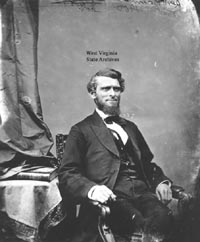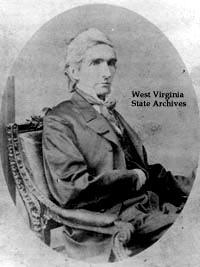

Chapter Seven
First Session of the
Second Wheeling Convention
June 11-25, 1861


June 11-25, 1861
| Due to the ratification of the Ordinance of Secession, on June 11, 1861, delegates gathered at Washington Hall in Wheeling to determine a course of action for northwestern Virginia. Committees on Organization, Rules and Credentials were immediately established. The Committee on Credentials ruled that 88 delegates, representing 32 counties, were entitled to seats in the convention, and the Committee on Permanent Organization selected Arthur I. Boreman to serve as president of the convention. Boreman acknowledged that "in this Convention we have no ordinary political gathering. We have no ordinary task before us. We come here to carry out and execute, and it may be, to institute a government for ourselves. We are determined to live under a State Government in the United States of America and under the Constitution of the United States. It requires stout hearts to execute this purpose; it requires men of courage - of unfaltering determination; and I believe, in the gentlemen who compose this Convention, we have the stout hearts and the men who are determined in this purpose." |
 |
Other delegates would be accepted as members during the convention. On June 13, the proceedings were moved to the Custom House. John Carlile, representing the Committee on Business, presented "A Declaration of the People of Virginia," a document that called for the reorganization of the government of Virginia on the grounds that due to Virginia's decision to secede from the United States, all state government offices had been vacated. On the following day, Carlile reported an ordinance for this purpose, and the debate began. |
 |
On June 20, the delegates selected officials to fill
the offices of the Restored Government of Virginia. Francis
Pierpont, of Marion County, was elected governor, and Daniel
Polsley, lieutenant governor. On the following day, James Wheat of
Wheeling was elected attorney general. In a speech to the
delegates, Governor Pierpont defended the actions of the
Convention, stating that "now we are but recurring to the great
fundamental principle of our fathers, that to the loyal people of a
State belongs the law-making power of that State." On June 25,
1861, the convention adjourned until August 6.
Primary Documents:Delegates to the Second Wheeling ConventionProceedings of the First Session of the Second Wheeling Convention "A Declaration of the People of Virginia" An Ordinance for the Reorganization of the State Government Editorials on the Declaration of the People of Virginia |
